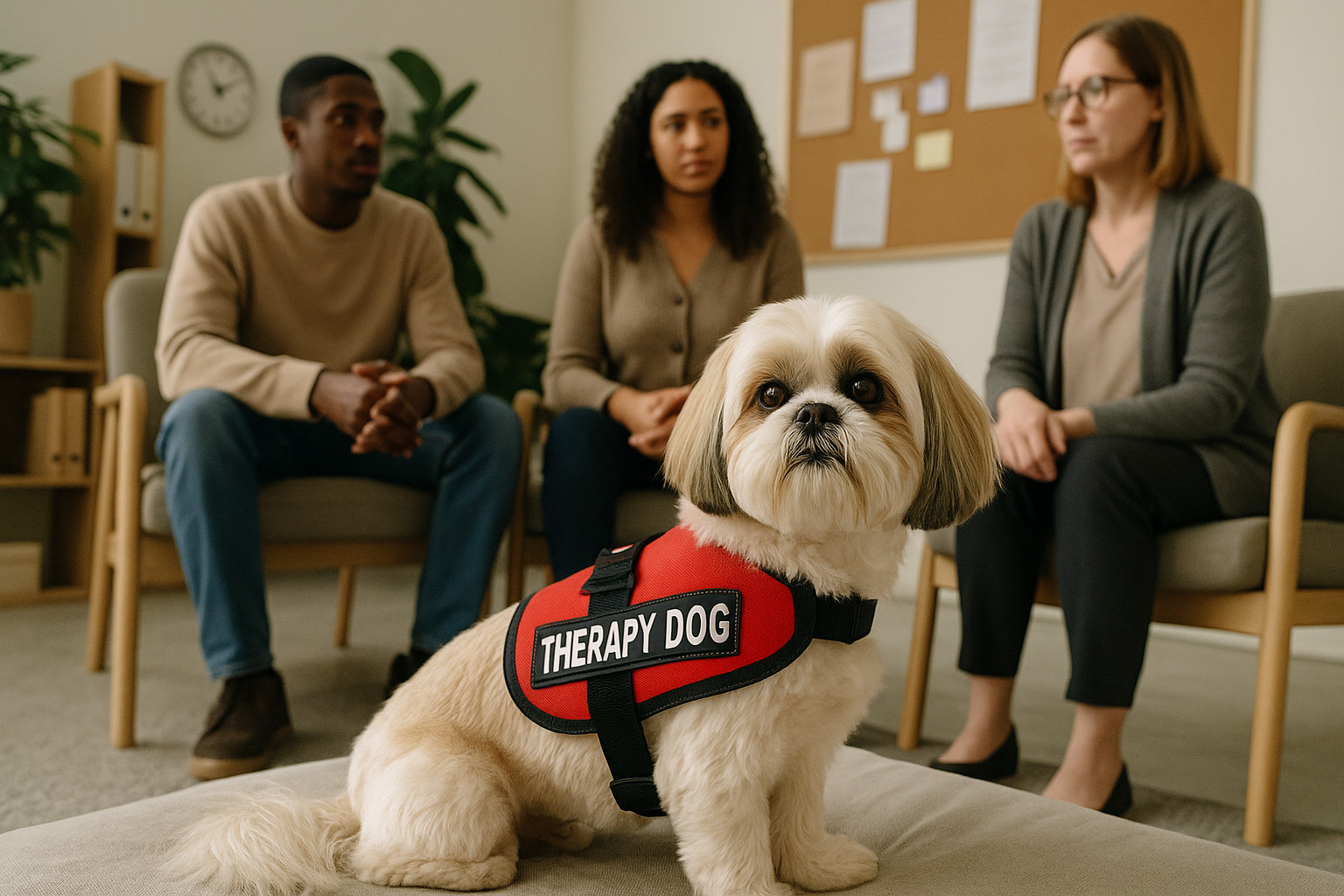Shih Tzu as a Therapy Dog
Get Your Documents

Shih Tzu as a Therapy Dog Overview
The Shih Tzu, a breed beloved for its elegant appearance and affectionate nature, has shown immense potential as a therapy dog. While many recognize them as companion animals, their adaptability and gentle demeanor make them excellent candidates for emotional support roles. In seeking to understand the suitability of Shih Tzus for therapy work, one must explore various factors including temperament, health, training adaptability, and the environments where they excel.
Understanding the Therapy Dog Role
Therapy dogs are tasked with the unique responsibility of providing comfort and support to individuals across a myriad of settings—ranging from hospitals to schools. Their role requires them to be calm, patient, and intuitive to human emotions. A therapy dog needs to navigate diverse situations with an open heart and stability, offering reassurance and companionship to those they meet. In this light, the Shih Tzu’s traditional role as a loving lapdog translates naturally to therapeutic environments, where their capacity for unconditional affection becomes a profound asset.
Physical Appearance and Energy Level
The Shih Tzu is a small-sized dog, typically weighing between 9 to 16 pounds, with a height of about 9 to 10.5 inches. Their compact size allows them to easily maneuver through tight spaces, making them ideal for visits in crowded or confined environments such as hospitals or nursing homes. Shih Tzus are not particularly high-energy dogs. They possess a moderate activity level, requiring regular exercise but not extensive activity sessions, which is beneficial in settings where restful periods might be needed. Their size and calm approach make them approachable and less intimidating to those who may be fearful of larger dogs.
Personality and Emotional Intelligence
Known for their affectionate and friendly nature, Shih Tzus often form strong bonds with humans, a trait critical to their success in therapy settings. Their emotional intelligence enables them to sense and respond to the emotional states of the individuals they interact with. Shih Tzus tend to be intuitive and perceptive, often seeking to comfort those who are distressed. This breed’s playful yet gentle manner can elevate the mood of patients and provide a delightful distraction from their ailments. Their capacity for empathy and connection is fundamental to their effectiveness as therapy dogs.
Environments Where Shih Tzu Excels
Shih Tzus are exceptionally adaptable and thrive in varied environments. They are particularly well-suited to indoor spaces due to their size and grooming needs, making them an ideal choice for settings like:
- Hospitals and medical facilities: Their gentle demeanor and calm presence can help ease anxiety and bring comfort to patients in recovery.
- Schools: Shih Tzus can offer companionship and support to students, especially those with learning difficulties or social anxieties.
- Nursing homes: Their comforting presence can stimulate positive interactions, helping to alleviate feelings of loneliness or depression among elderly residents.
- Rehabilitation centers: Shih Tzus provide a source of motivation and joy, aiding in the emotional recovery of patients undergoing physical and cognitive therapies.
Common Therapy Settings
- Pediatric wards: Their small size and friendly nature are ideal for working with children, as they can interact without causing fear.
- Psychiatric facilities: The Shih Tzu’s therapeutic impact is heightened due to their calming influence, assisting patients in emotional regulation.
- Community centers: Offering unconditional love and a sense of companionship, Shih Tzus support social interactions and community engagement.
Interactions with Different Populations
Shih Tzus have a remarkable ability to relate to diverse populations, adjusting their behavior to meet individual needs. They are typically:
- Patient with older adults: Offering stability and warmth, they engage elderly individuals, encouraging social interaction and reminiscence.
- Gentle with young children: They exhibit carefulness in their interactions, making them trustworthy companions for young ones, especially those with special needs.
- Understanding with emotionally vulnerable individuals: Their empathetic nature allows them to provide comfort and emotional support to those experiencing psychological distress.
Health and Wellness Factors
The overall health and ability of a Shih Tzu to perform therapy work are influenced by their physical condition and care requirements. Considerations include:
- Grooming: Shih Tzus require regular grooming to maintain their coat and hygiene, ensuring they are comfortable and presentable for therapy work.
- Exercise: Though not demanding high levels of activity, regular short walks are necessary to keep them healthy and content, supporting their role in therapy.
- Diet and nutrition: A balanced diet is essential to prevent obesity, which can limit their mobility and effectiveness as therapy dogs.
Lifespan and Common Health Issues
Shih Tzus have a lifespan of approximately 10 to 16 years. Several common health problems may affect their ability as therapy dogs, including:
- Brachycephalic airway syndrome: Due to their short snouts, they may experience breathing difficulties, which can impact stamina during therapy visits.
- Eye problems: Concerns such as cataracts or dry eyes require regular veterinary care to prevent discomfort and ensure they can perform therapy work comfortably.
- Dental issues: Regular dental care is crucial to prevent oral disease, which can affect their overall health and energy levels.
Maintenance and Care Needs
The care regimen for Shih Tzus involves several key aspects to ensure they remain healthy and effective therapy dogs:
- Grooming: Daily brushing and regular baths are necessary to prevent matting and skin infections, which can hinder therapy performance.
- Veterinary visits: Routine check-ups help manage pre-existing conditions and monitor their health, ensuring they remain in peak condition for therapy.
- Nutrition: A diet tailored to their activity level and age promotes longevity and vitality, crucial for sustained therapy work.
Training and Certification Readiness
Shih Tzus display a willingness to please, which aids their trainability. However, they may be slightly stubborn at times, requiring patient, positive reinforcement techniques during training. Key aspects of training for therapy certification include:
- Socialization: Exposing them to various environments, people, and situations enhances their adaptability and comfort in diverse settings.
- Basic obedience: Ensuring they understand commands such as sit, stay, and come to ensure they are well-behaved during sessions.
- Desensitization: Introducing them to potentially stressful stimuli, helping them remain calm and composed in active environments.
Learning Style and Responsiveness
Shih Tzus are intelligent and responsive, albeit sometimes independent. Their learning capabilities include:
- Quick adaptation: Once motivated, they respond eagerly to training, especially when rewarded with treats or praise.
- Intuitive understanding: Their ability to read emotional cues from humans helps them adjust their behavior to meet the needs of those they serve.
- Patience: While they enjoy learning, Shih Tzus benefit from consistent, short training sessions to avoid boredom or fatigue.
Handling Social and Emotional Stimuli
Shih Tzus handle social and emotional stimuli with grace, characteristics that support their success as therapy dogs:
- Tolerance to noise and activity: Their calm demeanor and lack of fear towards busy environments make them reliable in chaotic settings.
- Emotional support: They provide emotional stability, sensing distress and offering comfort through their attentive presence.
- Resilience: Despite their size, they display resilience in unfamiliar environments, maintaining composure under pressure.
Strengths, Limitations, and Ideal Roles for Shih Tzu
The Shih Tzu’s primary strength lies in their affectionate nature and adaptability. Their limitations are typically centered around health concerns requiring diligent care and attention. Ideal roles for Shih Tzus include:
- Companions in nursing homes: Their loving demeanor and calm presence are highly beneficial for elderly residents.
- Support animals in pediatric care: Their gentle interaction style is perfect for comforting young patients.
- Helpers in mental health settings: Providing emotional support and companionship to those undergoing therapy.
Final Thoughts
The Shih Tzu’s gentle, loving nature combined with their intuitive understanding of human emotions makes them exemplary therapy dogs. Whether they are comforting a child in a hospital or offering companionship to an older adult in a nursing home, their ability to provide emotional support and foster positive interactions highlights their value. Through proper training, care, and understanding of their health needs, Shih Tzus can thrive as reliable and loving therapy dogs.
Key Takeaways for the Shih Tzu as a Therapy Dog
- Best suited for: Nursing homes, pediatric wards, mental health facilities
- Not ideal for: High-energy environments or applications requiring extensive physical activity
- Temperament highlights: Affectionate, intuitive, calm, patient
- Care and health notes: Requires regular grooming and veterinary care; attention to common health issues is critical
- Therapy environments where they shine: Indoors, calm settings, close-contact interactions
Get Your Documents
Example State Cards













